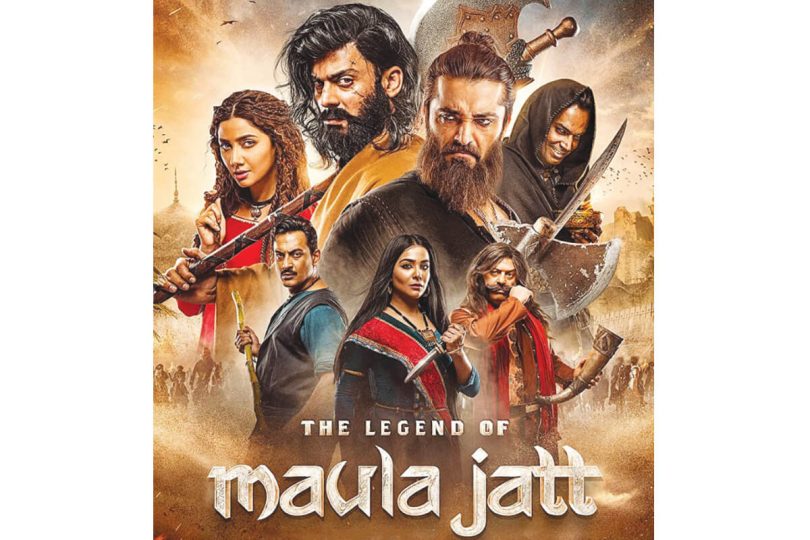Some films become successful, some become blockbusters but only a handful of them go down in history as game changers and the young film director Bilal Lashari’s The Legend of Maula Jatt is one such film. It is nothing short of brilliance, considering it was produced in a country where producers go for shortcuts than spend money, where actors rarely work on their physiques, and where post-production isn’t considered a distinct art or a standalone discipline of cinematography. Changing the way films are viewed in Pakistan, The Legend of Maula Jatt will also inspire a generation of filmmakers, who until now had little faith in the industry’s revival. This big-budget film not only gives them hope but also tells them that if they set their heart and mind behind a project, they too can change the world.
The Plot
The Legend of Maula Jatt revolves around the origin of Maula Jatt (Fawad Khan), the son of the late Sardar Jatt, and his wife (Babar Ali and Resham in cameos) who were murdered in front of him when he was young. Raised by a foster mother Daani (Raheela Agha) alongside her own son Mooda (Faris Shafi), Maula grows up with no recollection of their murder but has nightmares about it. He finally uses that rage to become a wrestler who wins battles in the ring until one day he finally learns the truth about the massacre that resulted in his parents’ bloody deaths.

Against his foster mother’s wishes, Maula decides to avenge their deaths, and all hell breaks loose, which results in the death of his villagers as well as the Natt clan, led by Jeeva Natt (Shafqat Cheema) who was responsible for making Maula orphan. However, Maula has to battle Jeeva’s addict son Maakha (Gohar Rasheed) and jailed-for-pleasure son Noori (Hamza Ali Abbasi) as well as reject the advances of hot-as-hell Daaro (Humaima Malik) in order to achieve mental peace. Add to the equation Mukkho (Mahira Khan) who is in love with Maula, and the story becomes both complicated and interesting.
The Good
Very rarely does a film tick every box in the viewers’ invisible checklist, but The Legend of Maula Jatt does that because the director Bilal Lashari and the producers Ammara Hikmat, Asad J Khan, and others spared no money during the production of the film. From selecting the best actors for the characters to ensuring that each actor looked the part, they did no wrong. The contemporary look might confuse some viewers but it couldn’t have been avoided, because then it wouldn’t have attracted the crowd as it did. Despite not being native Punjabi speakers, Fawad Khan, Humaima Malik, and Mahira Khan compensated for their pronunciation weaknesses with their mannerisms and managed to do a commendable job, especially Fawad who battled health issues to gain weight. One must not forget the film’s solo comic relief Faris Shafi who got the audience to clap for a supporting character whenever he appeared on the screen with his catchphrase.
However, the film belonged to the one and only Noori Natt, without whom Maula Jatt wouldn’t have become a legend. Hamza Ali Abbasi breathes life into Mustafa Qureshi’s iconic character and makes it his own, using his powerful vocals to the best of his abilities, and then combining them with his facial expressions which changed according to the situation. Thanks to the producers, the fight instructors from abroad were able to finally give the Pakistani viewers something to remember because no film before TLOMJ had better action sequences in the history of Pakistani cinema. The fight scenes featuring Maula and Noori are pure gold, and it wouldn’t be incorrect to say that it made some of the scenes in the original film look mediocre.
Nasir Adeeb’s dialogues contain the same fire they had in the original flick, and although it seems that he and Bilal mixed both Wehshi Jatt (Maula Jatt’s prequel) and Maula Jatt together, they were able to do a great job. The production values, the costume designs, and the attention to detail that is usually missing in a desi, Pakistani film – be it Urdu or Punjabi – were present there, especially in the scene where Maula Jatt turns to violence for the first time. The pace of the film remains constant throughout and not once scene seems out of place, which is commendable again for a Made in Pakistan flick.

Although the film doesn’t have a song, it does have a ballad and a dance number, which are aptly placed and carry the story forward. No one would have been able to do a better job at that other than Saima Baloch who adds grace and fire to her steps that are integral to the plot. The editing at that time as well as throughout the film is first-rate, and so is the background score that compensates for the lack of songs. The ‘Western’ feel is what keeps the audience enthralled and they hardly have time to look at their watches.
The Bad
Former Junoon band-member and singer Ali Azmat seems to be the only miscast character in the film because first, he doesn’t look like someone who is a wrestler or a wrestling coach, and second, it’s hard for someone as famous as him to shed his usual persona and become someone else. He seemed more like a 1990s guy stuck in the time of his great-great-great grandfather, and his dialogue delivery didn’t help either.
Also, Maula’s backstory could have been revealed moments before the intermission, instead of in the beginning because then the audience would have been in for a bigger shock. Yes, the film’s bloody action sequences aren’t recommended for the weak-hearted but then, it’s a film featuring a gandasa, you can’t have song and dance only. Finally, in the scene where Maula learns about his past, there is a dialogue in the background that could have been avoided since it gives a ‘Lollywood’ feeling, which isn’t present anywhere else in the film.
The Verdict 4.75/5
Bilal Lashari’s flick is not just a Pakistani film, it’s a Hollywood like experience that puts Pakistan finally on the map of international cinema. Before that, whatever Pakistan had produced was either Bollywood-inspired or a version of an English film, novel, or both. Despite being an update of an already successful Maula Jatt, Bilal Lashari’s retelling was first-rate, where even the audience had no time to search for mistakes. Some are claiming that the Punjabi dialect in the film isn’t correct, but neither is the Punjabi setting, no one can point out which year the film depicts, and that’s what gives the film a ‘fantasy feel’.
To this scribe, the cameos from Jaanu Sun Zara couple were something to take home, and one must commend the director’s vision for that since it caters to the audience of both the old and the new era. The film in turn would not only prove to be a huge step for Pakistani cinema but also give other filmmakers something to think about, who were till now able to get away with mediocre films in the name of ‘reviving Pakistani cinema’. The cinema can only be revived and supported by larger-than-life films, and until and unless one makes such films, the audience will keep their support for them, and wait for the right film no matter how long it takes. If a one-film old director like Bilal Lashari can make a high-quality film like The Legend of Maula Jatt in Pakistan, then so can the other filmmakers. All they have to do is think bigger, and broaden their horizon like the makers of this film. -Ends







